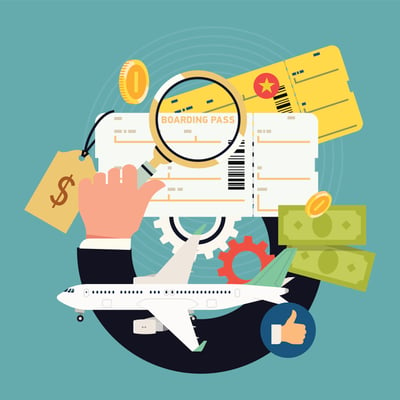September 20, 2023
 by Nupur Chaturvedi / September 20, 2023
by Nupur Chaturvedi / September 20, 2023

Data has always been the cornerstone of all strategic business decisions.
Yet, this approach is not as widespread when it comes to steering data-driven decisions about employees’ travel.
As business travel continues to grow in importance, it becomes imperative for companies to shift their focus toward technological solutions. Business travel analytics can be used to gain insights into your travel needs. This can help transform your company’s travel management, optimize costs, enhance traveler experience, and help make smarter decisions.
But how can you fully take advantage of the endless opportunities accompanying business travel analytics?
Read this article to learn more about the significance of business travel analytics in restructuring your corporate travel management practices and how to unlock its boundless potential.
Business travel analytics refers to the use of smart technologies for analyzing an organization’s travel data and translating it into focused insights. These targeted insights help companies to optimize their travel policies and increase the efficiency of their travel programs.
The analysis of travel data includes four steps:
With the power of these insights, companies can better understand their travel spending, traveler behavior, and risk management, which benefits both the organization and its employees.
“With great power comes great responsibility.” The famous quote stands true for travel managers with the responsibility of improving their company’s travel program for more efficiency.
Hence, merely collecting corporate travel data would not suffice. Travel managers must be able to categorize and process this data meaningfully to review, improve, and introduce better travel policies within their organization.
Here are three types of data analysis that can not only give complete visibility but also open the door toward making better decisions when it comes to the company’s business travel and expense management:
Source: myBiz by MakeMyTrip
Travel expenditure is a crucial element of business travel data. By closely tracking the traveling expenses of the company’s employees, it is easy to identify core areas of:
It can further highlight appropriate areas that require budget allocation and areas that have an opportunity to cut down on costs. With smart travel data solutions, companies can plan their travel budget to generate higher savings.
While increasing business travel savings is the ultimate goal, companies must also work towards enhancing the traveler experience. This goal is easy to meet with business travel analytics as it evaluates traveler behavior, trends, and booking preferences.
By implementing these travel insights, businesses can unlock higher profitability as it allows them to align their savings goals with the satisfaction of their business travelers. Paying heed to tailored recommendations generated by behavioral data analytics can make personalizing the employees’ travel easier, which can lead to increased productivity.
Prioritizing the safety of employees is a must when it comes to managing corporate travel. Risk management analytics can be used to identify potential travel risks, assess their possible impact, and proactively minimize them.
A data-driven approach, thanks to travel data analytics, can help mitigate these risks while allowing companies to fulfill their duty of care obligations.
Looking for the right platform to put those analytics into action? Explore my roundup of the best travel management software for businesses in 2025.
The right data can offer your organization enriched information that is vital in improving the company’s practices and policies. The benefits of business travel analytics are far from limited, and having that advantage can set you apart from the competition.
Managing business travel expenses can be challenging. When travel is booked across different platforms, it becomes difficult to accurately forecast expense projections, and it’s easy to go over budget if you're not careful.
Analytics solves this by offering visibility into spending patterns, helping finance teams pinpoint overspending areas, and applying cost-saving measures.
By personalizing travel experiences for employees, companies can show that they care about their wellbeing.
With the help of data, it becomes much easier to address their pain points and heed their preferences. This ensures that employees are happier and more engaged, thereby positively impacting productivity levels.
Data builds the most accurate picture, offering insights to help stakeholders like travel managers, finance teams, and HR make smart decisions.
With the power of analytics, they can improve existing policies, better allocate resources, and choose suppliers that are good for business. It makes spotting trends and developing effective strategies to boost management practices easier.
Once travel managers have gathered all the necessary data, they can use it as a guiding light to improve their corporate travel program.
They can utilize data to strike a balance between smart spending and efficient operations. This can lead to higher savings, better compliance, and more comfortable employee travel experiences.
Source: myBiz by MakeMyTrip
A thorough analysis of booking timelines, from the departure date to the return bookings, can help companies set up policies encouraging advance bookings.
This data, therefore, has the possibility of reducing increasing costs due to last-minute bookings.
Observing an increasing instance of out-of-policy bookings can hint at the need for policy exceptions.
By recognizing the time-sensitive nature and uncertainty associated with traveling for business, companies can create exceptions in the policy that balance adherence with flexibility.
If the company’s travel booking costs are stacking up, it’s time to analyze the frequency of premium flights booked.
By identifying and capping such bookings, the unnecessary expenditure on corporate travel can be curbed, proactively managing costs. Alternatively, define the instances where such bookings are permissible along with the approvals flow to be followed.
By evaluating the travel spend on hotel bookings across different cities, travel managers can implement limits on the amount spent based on the employee’s designation and the city tier.
Travel managers can also include the circumstances where these bookings are allowed and who needs to approve them in case of an exception.
Travel managers can spot frequently chosen hotel booking options from previous reservations and list them as preferred accommodations basis the organizational structure.
This helps save time and money while ensuring your employees experience ultimate comfort during their business trips.
Travel managers can use the data on GST-assured hotels in India and the savings incurred by using these invoices to claim tax benefits like input tax credit (ITC) to further refine their list of preferred hotels. Not only will this ensure that the accommodation options comply with the GST regulations in India, but it will also serve as a window of savings for companies.
To make this process smoother, businesses can work with the right travel management software that facilitates assured GST hotel invoices to maximize savings.
For companies to fully maximize the benefits of business travel analytics, having accurate and relevant data is the key. Hence, a lot relies on how businesses gather this data.
Here, we’ll explore the most relevant data sources to optimize your company’s travel strategy.
Collecting travel data can be a breeze with a well-integrated business travel and expense management system in place. With the help of the right travel & expense software, businesses can easily capture relevant data like travel bookings, travel expenditure, travel compliance, travel patterns, and more.
It can be easy and efficient to leverage the data collected through these systems, like GST on travel expenses or ITC on traveling expenses, among others. This can help gather in-depth insights into the organization’s travel practices.
The data collected can then play a central role in streamlining your employees’ business trips, making travel smoother.
Growth is driven by constant improvement. The best way for companies to figure out what needs change is by frequently collecting feedback from employees traveling for business. These traveler surveys can highlight the core areas of change based on their preferences, experiences, and challenges.
Combining this qualitative data with quantitative analysis can offer a better understanding and help travel managers develop business travel ideas for improvement.
It’s common knowledge that travel policy compliance is the secret to saving money on business travel. However, you might not be aware that tracking compliance data can give you valuable insights into your company’s travel patterns.
Setting up a comprehensive travel policy for employees in India can help organizations keep an eye on compliance and offer more control over the company’s travel and expenditure. It offers a keyhole view of non-compliance areas requiring immediate corrective actions.
Hence, keeping tabs on policy compliance is a smart way to use data to drive cost savings for the company.
Gathering travel data is only the first step to business travel analytics. The real challenge is figuring out how to make sense of the data collected from hundreds and thousands of bookings each month.
This is where the magic of business travel analytics can help you. But you need the right tools and techniques to do it.
Source: myBiz by MakeMyTrip
Until your data tells a story, it is not meaningful.
Digestible data is the easiest way to analyze and understand traveler behavior and spending. A highly visual and easy-to-understand dashboard that provides at-a-glance performance insights can enable stakeholders to spot trends and insights quickly.
Data visualization thus breaks down complex information and helps illuminate patterns that guide effective decision-making.
Identifying growth opportunities is easier when there is both insight and foresight. An easy way to do that is by using predictive insights to experiment with travel policy changes and analyze how they impact future performance.
By looking at historical data, companies can forecast:
With this knowledge, organizations can gain the upper hand in supplier negotiations, anticipate upcoming problems, and optimize the travel program for maximum success.
The use of advanced technologies like AI or ML can help businesses analyze large amounts of data. Processing this can uncover unique patterns and connections that can boost the growth of any company.
Hence, when it comes to business travel, automating the multiple steps involved can help quickly detect anomalies and optimize the travel program for personalized travel.
To make the most out of business travel analytics, every organization must adhere to the following best practices:
Harnessing the benefits of business travel analytics can give your company a serious edge. In this age of data-driven decision making, it truly holds the key to transforming your corporate travel management.
Leveraging the power of analytics can maximize your savings, enhance traveler convenience, and, more importantly, ensure your employees are safe. Business travel analytics thus provides actionable steps that can lead to happier business travelers who deliver results that scale your company’s growth.
Travel smart. Plan cost-efficient corporate trips with the help of business travel management services providers.
Nupur Chaturvedi wears many hats at MakeMyTrip, leading marketing, strategy, analytics and insights. With 14+ years of experience, she’s all about seizing business opportunities for growth. An engineer from BITS Pilani with an MBA from ISB, Nupur’s specialties include business development, partnerships, analytics, and nailing digital marketing initiatives, among many others.
Data is a goldmine to the business travel industry, but only if managed effectively.
 by Nupur Chaturvedi
by Nupur Chaturvedi
Business travel is a trillion dollar industry. With all of the money that is spent on travel...
 by Rob Browne
by Rob Browne
Expense management platforms and travel booking platforms, or online booking tools (OBTs), are...
 by Pete Solomon
by Pete Solomon
Data is a goldmine to the business travel industry, but only if managed effectively.
 by Nupur Chaturvedi
by Nupur Chaturvedi
Business travel is a trillion dollar industry. With all of the money that is spent on travel...
 by Rob Browne
by Rob Browne


